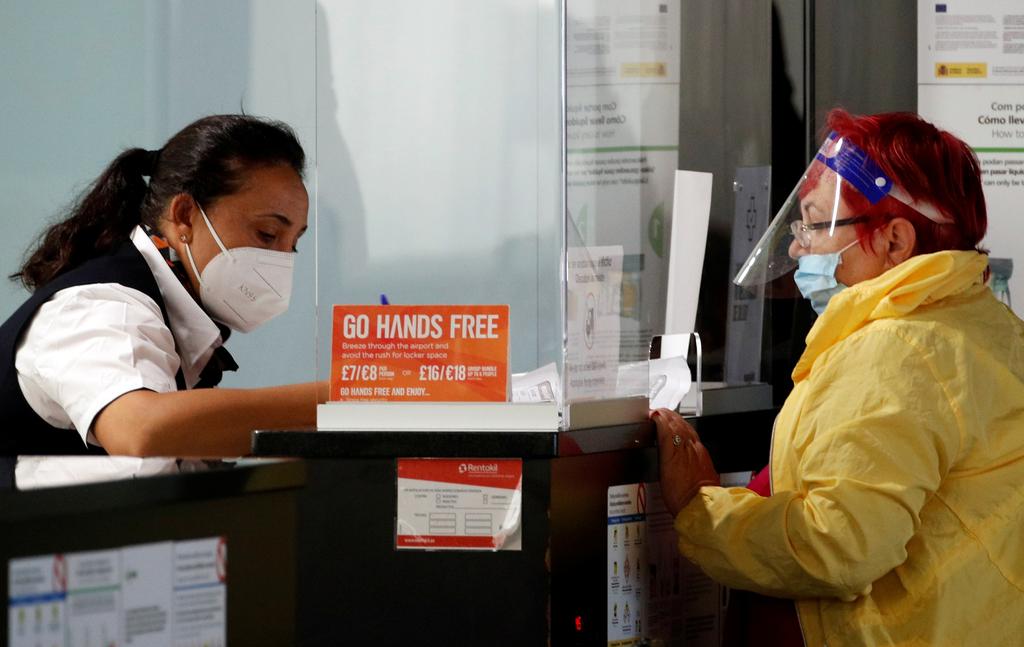
MADRID/LONDON (Reuters) – British foreign minister Dominic Raab on Sunday stood by his government’s abrupt decision to impose a two-week coronavirus quarantine on travelers returning from Spain, which has provoked anger and confusion among tourists.
The measure scuppered the plans of many people either on holiday or planning to take one there and also hit hard at the Spanish tourism sector just as it emerges from months of lockdowns and travel restrictions.
The move to take Spain off a safe-travel list was announced late on Saturday and took effect just hours later, leaving travelers with no time to dodge it or plan ahead.
Raab defended it as a “real-time response” to a jump in coronavirus cases reported in Spain on Friday, the latest in a month-long resurgence in infections.
“We can’t make apologies…we must be able to take swift, decisive action,” he said on Sky News.
The opposition Labour Party’s health policy chief, Jonathan Ashworth, slammed Prime Minister Boris Johnson’s government for its “frankly shambolic” handling of the measure.
At Madrid’s Barajas airport Emily Harrison, who was taking a flight to London, faced having to self-isolate for two weeks.
“It’s really bad because it’s just come all of a sudden, it’s not given very much time to prepare so everyone is now panicking,” said Harrison, from Essex.
Spain had been on a list of countries that the British government had said were safe for travelers to visit – meaning tourists returning home would not have to go into quarantine.
But it has seen cases rise in the last few weeks, prompting most regions to impose rules for masks to be worn everywhere and, in several areas including Barcelona, calls for people to stay at home.
Most of the new cases have been concentrated in the northeastern region of Catalonia and neighboring regions, so a lot of the criticism focused on the fact that the quarantine also applies to areas like the Balearic Islands, which have been spared the brunt of the pandemic.
“This is ridiculous. There are almost no cases here and there’s a far higher chance of contracting it when I get back to Britain,” said John Snelling, 50, from Stratford-upon-Avon, who was on holiday in Menorca.
Britain has been the hardest hit country in Europe by the pandemic. Spain was also badly affected, with more than 290,000 cases and over 28,000 deaths. It imposed very strict lockdown measures, gradually easing them earlier in the summer.
The government response has been muted so far. Government officials said on Saturday and Sunday that Spain is safe, with clusters under control, adding Madrid “respects decisions of the United Kingdom” and is in touch with British authorities.
‘ABSOLUTE DISASTER’
The British decision follows steps by Norway on Friday to re-impose a 10-day quarantine requirement for people arriving from Spain, while France advised people not to travel to Catalonia.
But a collapse of tourism from Britain would have far more of an impact on the economy in Spain, where tourism accounts for 12 percent of GDP. Britons made up more than 20 percent of foreign visitors to Spain last year, the largest group by nationality.
“This decision is an absolute disaster for the recovery, there’s no other way to see this,” Angel Tavares, head of European Economics at Oxford Economics consulting, said on Twitter, referring to the quarantine ruling.
Antonio Perez, the mayor of the Mediterranean resort of Benidorm that is hugely dependent on British tourists, said it was a “tough blow”.
In addition to the quarantine, the British foreign ministry advised against all but essential travel to mainland Spain.
Regional authorities in the Canary and Balearic Islands, which are popular holiday destinations, said they would try to get an exemption from the quarantine for people traveling back from the archipelagos.
Reporting by Elena Rodriguez and Guillermo Martinez; Additional reporting by Michael Holden, Ingrid Melander and Elizabeth Piper; Writing by Ingrid Melander and Nathan Allen; Editing by Robert Birsel and Frances Kerry
Image: A woman stands at the EasyJet check-in desk at Josep Tarradellas Barcelona-El Prat airport, amid the spread of the coronavirus disease (COVID-19), in Barcelona, Spain, July 26, 2020. REUTERS/Albert Gea




